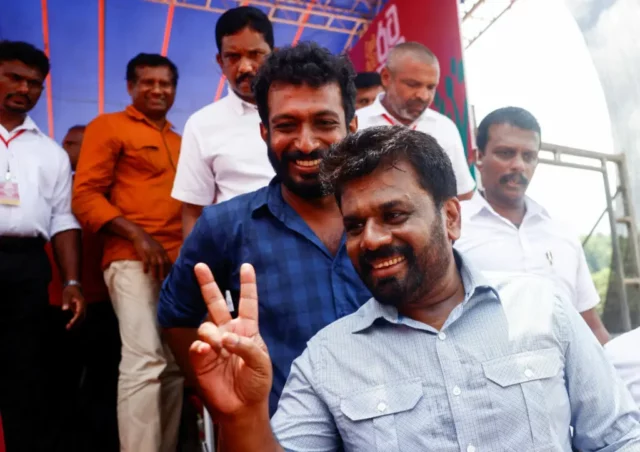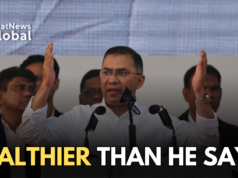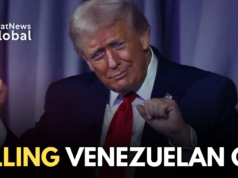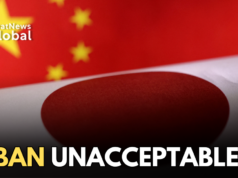Anura Kumara Dissanayake, Marxist-leaning middle-aged leader and former Member of Parliament, is all set to become Sri Lanka’s new President.
Dissanayake Is Leading
While counting of votes for the Presidential election is underway, Disanayake is leading.
While Dissanayake’s loyalists have started celebrating his victory. they are also mindful of the final picture.
Sri Lanka’s Election Commission Now Counting Second Preference
The election body has withheld announcement of results because no candidate has crossed fifty per cent of the total votes polled.
Sources in Colombo said that the poll body will count second preference.
Sri Lanka’s election system allows voters to cast three preferential votes for their chosen candidates.
If no candidate wins 50% in the first count, a second round of counting determines the winner between the two top candidates, using the preferential votes.
Declaration Of Election Results Likely To Be Delayed
The declaration of final results by the Election Commission of Sri Lanka, is likely to be delayed because of this scenario.
Sri Lanka went to the polls on Saturday to elect the nation’s 10th president.
Anura Leading
According to official results announced so far, Anura Dissanayake has got almost 42.31 per cent of the total votes polled.
Since Anura continues to lead by a comfortable margin, even after second preference vote of the candidate positioned third is counted, the person who gets simple majority will win.
Sajith Premadasa has got 32.76 per cent votes while Ranil Wickremesinghe has got 17.27 per cent votes.
Dissanayake Enjoys Popularity
Anura popularly known As AKD represents the National People’s Power alliance, which includes his Marxist-leaning Janata Vimukthi Perumuna party.
Dissanayake, 55, leader of the National People’s Power alliance, represented the Colombo district for ten years.
In 1995, he became the National Organizer of the Socialist Students Association and was appointed to the Central Working Committee of the JVP.
He was appointed to the Politburo of the JVP in 1998.
President Holds Office For Five Years
According to the 19th Amendment of Sri Lanka’s Constitution, passed in 2015, the president holds office for five years, and has a two-term limit.
The election has taken place at a time when Sri Lanka is grappling with a severe economic crisis.
Size Of Electorate
More than 17 million of Sri Lanka’s 22 million people were eligible to vote in the election, contested by some 38 candidates.
Voters Have Rejected Incumbent President
Insiders said that voters have rejected Ranil Wickremesinghe, 76 year incumbent President and six-time Prime Minister has not got the vote share he expected.
A Close Contest
The election has been a close contest between President Ranil Wickremesinghe, main opposition leader Sajith Premadasa and Anura Kumara Dissanayake.
Sajith Premadasa of the Samagi Jana Balawegaya (SJB) party is leader of the Opposition and alumnus of the London School of Economics.
Sajith, 57, lost to Gotabaya Rajapaksa in the 2019 Presidential election.
He has promised to fight for a brighter Sri Lanka.
Sajith’s father Ranasinghe Premadasa was the President of Sri Lanka from 1989 to 1993.
Ranasinghe Premadasa was assassinated by an ethnic Tamil separatist suicide bomber in 1993.
Dissanayake Confident Of His Victory
Despite getting only three per cent vote share in the 2019 Presidential election and in the race with veteran leader, Wickremesinghe, he was sure of his victory this time.
Anura Dissanayake narrowly led in one recent opinion poll.
Dissanayake said at a recent rally, “Now that victorious moment is finally here and we should work together to ensure it is not lost.”
Sure enough, his vote share since then has risen by nearly 16 per cent.
Dissanayake’s Marxist party had previously struggled for political influence, securing less than four per cent of the vote in the most recent parliamentary elections.
Economic Crisis
The Presidential election on Saturday was the first election conducted in the island nation after it plunged into its worst economic crisis in 2022.
In the mass protests the same year, the then President Gotabaya Rajapaksa was overthrown.
Ranil Wickremesinghe was then elected president through a parliamentary vote.
Why Dissanayake Is Leading?
Analysts say that many factors have gone in Dissanayake’s favour.
Sri Lanka’s ‘Aragalaya’ uprising that deposed the nation’s president two years back, empowered Anura Kumara Dissanayake to lead the fight against corruption.
His National People’s Power alliance pledged to bring about change that the Aragalaya movement had clamoured for.
What Political Analysts Say?
Dr Damenda Porage, Colombo based Buddhist activist is sure o Dissanayake’s victory.
Apart from the fact that Sri Lankans wanted change, many factors have gone in Dissanayake’s favour.
“ Firstly, he has an ordinary family background. He studied in a government school and later enrolled in University of Kalaniya in Colombo. This is a government university.’’
Dr Porage told StratNews Global that Dissanayake comes from a non political family. “People here are fed up with dynastic succession in politics.’’
He said that Sri Lankans are fed up with corruption.” They believe that only a corruption free government can help the country prosper.’’
An Election That Will Change Sri Lanka’s History
After casting his vote at a temple in the outskirts of Colombo, Dissanayake said,”This is an election that will change the history of Sri Lanka.”
I Am Ready To Serve Sri Lanka: Dissanayake
In the run up to the Presidential election, Dissanayake declared that he was ready to serve Sri Lanka.
He called the election a “perfect opportunity” for voters to put behind the pain and suffering of the crisis.
Voting And Counting
Voting closed at 4 p.m. (1030 GMT) and counting started later.
Saturday’s voting was peaceful across the South Asian island nation.
The election body confirmed the deployment of over 250,000 public officials for managing the election.
More than 13,000 polling stations were set up.
Delhi based journalist pickled in journalism. Have reported from nine world capitals and almost all parts of India. Over the last three decades, I have worked for India’s mainstream English dailies and contributed to All India Radio, Doordarshan and Women’s Feature Service. Also worked for international media including Japan’s leading newspaper, The Asahi Shimbun and done assignments for The Sunday Times, London, The Telegraph, The Guardian and the Canadian Broadcasting Corporation. Worked in the Embassy of France in New Delhi and can speak French to save my life. Write on Diplomacy, Politics and the social sector. Love Nature, heritage, Nature, animals and vintage cars. Enjoy cycling and playing badminton.





